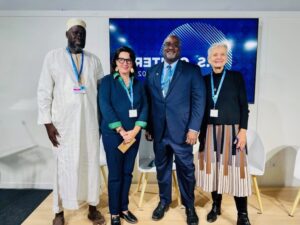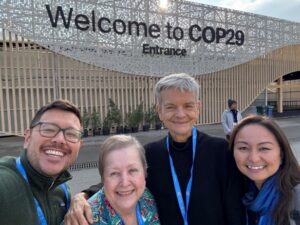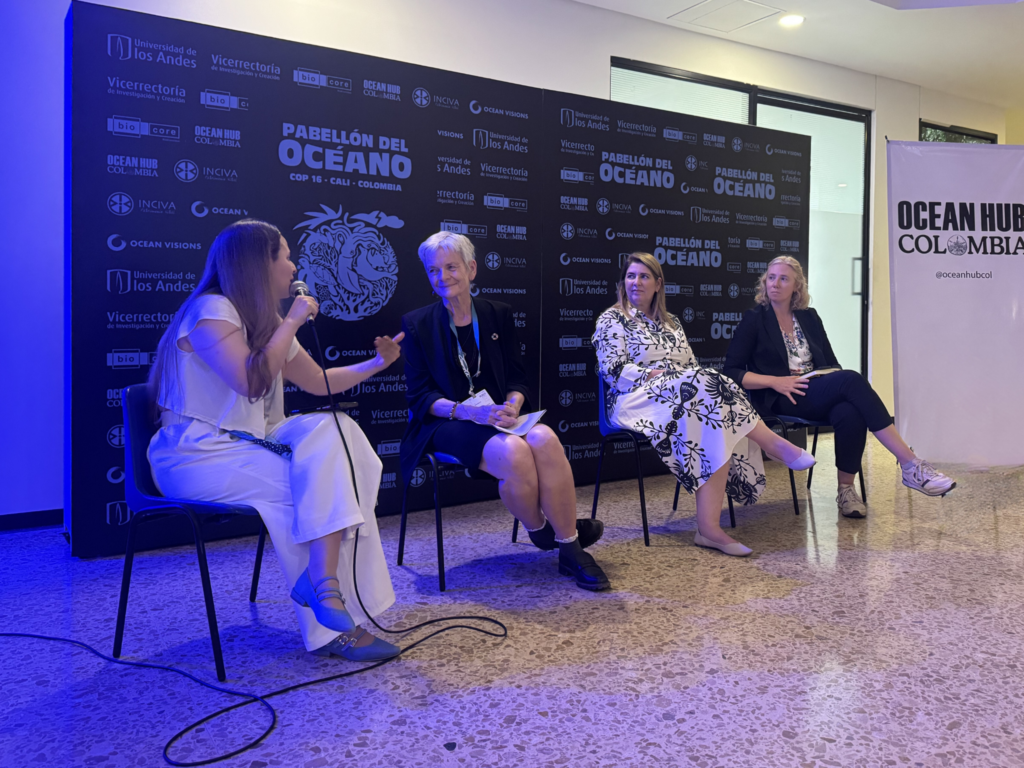Over the past few months, I’ve been honored to represent AGU at two key global events: the UN Biodiversity Conference 2024 in Cali, Colombia (CBD16), and the UN Climate Change Conference in Baku, Azerbaijan (COP29).
Reflecting on these meetings, it’s clear that the outcomes fall short of the urgency demanded by the biodiversity and climate crisis. At COP29, critical issues like equitable funding for climate adaptation, activation of the loss and damage fund, and stronger commitments to emissions reductions were sidelined, leaving vulnerable communities without critical support.
That said, while we often focus on the high-level negotiations, both CBD and COP are about much more than what’s happening on the main stage. They are essential meeting grounds for nations, organizations and communities to come together to advance objectives, propose new initiatives and meet potential partners.
For AGU, these meetings provide a platform to amplify scientific voices and to build partnerships that transform knowledge into action. As the world’s largest Earth and space science association, AGU is uniquely positioned to advance biodiversity and climate solutions through our meetings, publications and programs. By sending our delegates, we aimed to foster meaningful dialogue, strengthen our global partnerships and advocate for ethics in climate solutions.
Ethics for Climate Solutions
One of AGU’s top priorities at both CBD16 and COP29 was to advance the Ethical Framework Principles for Climate Intervention Research, which we launched in October. This framework represents a culmination of two years of collaboration with a panel of global experts across science, health, technology and policy to develop a set of guiding principles for conducting responsible and inclusive research, with a focus on protecting vulnerable communities and preventing unintended consequences.
At both events, the framework became a foundation for critical discussions on emerging technologies, such as carbon dioxide removal and solar radiation modification. As AGU delegates, we stressed that ethics must be a guiding principle, not an afterthought, in developing solutions that are equitable and inclusive.
AGU President Lisa Graumlich joins other panelists at the Ocean Hub Columbia launch to discuss ocean-based climate solutions and ethical frameworks for action.
CBD16: A Focus on Biodiversity
In October, AGU attended the UN Biodiversity Conference (CBD16) for the first time, bringing attention to the vital link between biodiversity and climate action.
During the meeting, our delegation held more than ten one-on-one discussions with governments, NGOs, and intergovernmental organizations, laying the groundwork for future opportunities to work together on impactful solutions.
A standout moment was the launch of Ocean Hub Colombia, where I joined a panel of distinguished scientists to discuss the ocean’s role in climate regulation and its potential for climate solutions.
COP29: A Platform for Global Collaboration
In Baku, our delegation returned to the Ocean Pavilion, where we partnered with over 14 organizations to host a vibrant hub for dialogue and collaboration. The pavilion served as our home base to meet with attendees and advocate for AGU’s global initiatives on climate intervention, community science, open science and mentoring. Over two weeks, we hosted more than 18 bilateral meetings with governments, NGOs and intergovernmental bodies, opening doors to deeper partnerships and shared goals.

At the U.S. Center for COP29, AGU President Lisa Graumlich led a discussion on new approaches governments and partners are taking to protect communities from increasingly dangerous heatwaves.
AGU participated in 11 events at COP29, bringing together voices from across the globe to advance key conversations on ethics and climate. Sessions like Ethical Pathways in Climate Intervention explored the responsibilities of emerging technologies, while Women Leading the Wave celebrated women in ocean science. Harnessing Community Science for Climate Action showcased adaptation and mitigation efforts at the local level and Three COPs, One Ocean examined links between climate, biodiversity and desertification. Recordings are available at agu.org/AGU-at-COP.
One personal highlight was participating in a panel alongside religious leaders to discuss the unique role of faith communities in addressing the climate crisis. As both a scientist and a deacon in the Episcopal Church, I’ve come to appreciate how science and faith can intersect to inspire collective action. We had an encouraging discussion that explored the moral imperative to protect creation, our capacity to model sustainable practices and the crucial role of faith communities in addressing climate grief and despair.
Spotlighting AGU Members
For me, one of the most rewarding parts of COP29 was connecting with AGU members and learning about the many ways they are driving climate action—from presenting groundbreaking research to advocating for critical issues. It was an honor to spotlight their work on social media through #AGUatCOP, highlighting how scientists like Caitlin Grady, Ken Kostel, Matthew Manu, Monique Kuglitsch, Onyinye Nwankwo and more have leveraged their expertise to educate, inspire and create meaningful change.

AGU’s delegation from left to right: Mark Shimamoto, Janice Lachance, Lisa Graumlich and Hisayo Fujikawa Harlan.
Looking Ahead
As I reflect on both CBD16 and COP29, I am filled with a renewed sense of urgency and hope. The road to meaningful biodiversity and climate action is not without challenges, but the connections we’ve built here reaffirm the power of collaboration and the indispensable role of science in addressing complex global challenges.
AGU24, with its theme “What’s Next for Science,” will be another moment to unite as a scientific community and build on the progress and partnerships established this year.
A special thank you to our delegation, particularly Janice Lachance, Mark Shimamoto and Hisayo Fujikawa Harlan, for their outstanding contributions. I’m deeply grateful to AGU’s leadership team, including the Board and Council, for their steadfast commitment to our mission and support in driving global collaboration.
Best,
Lisa J. Graumlich, PhD
2023-2024 AGU President




















Discussion about this post